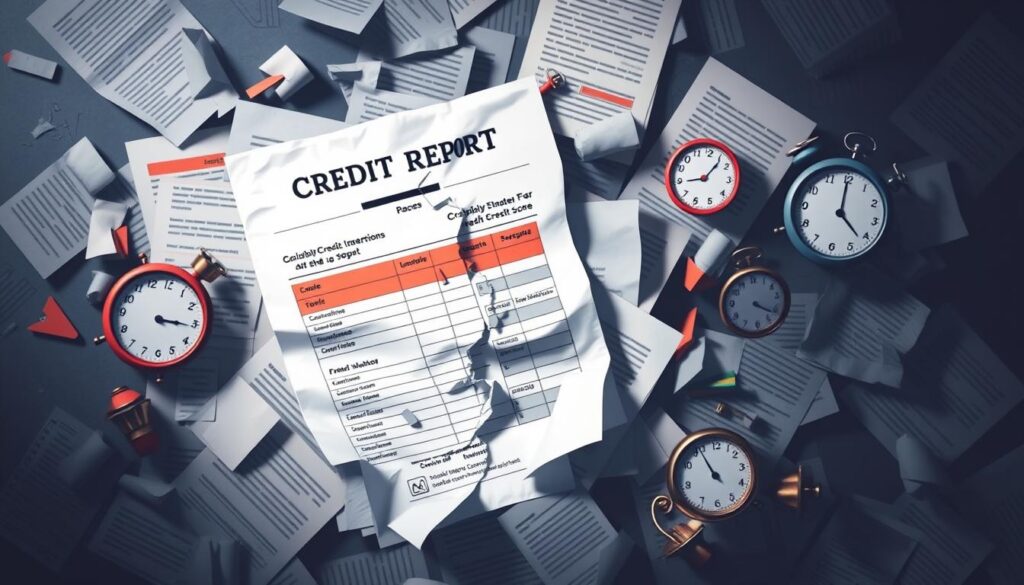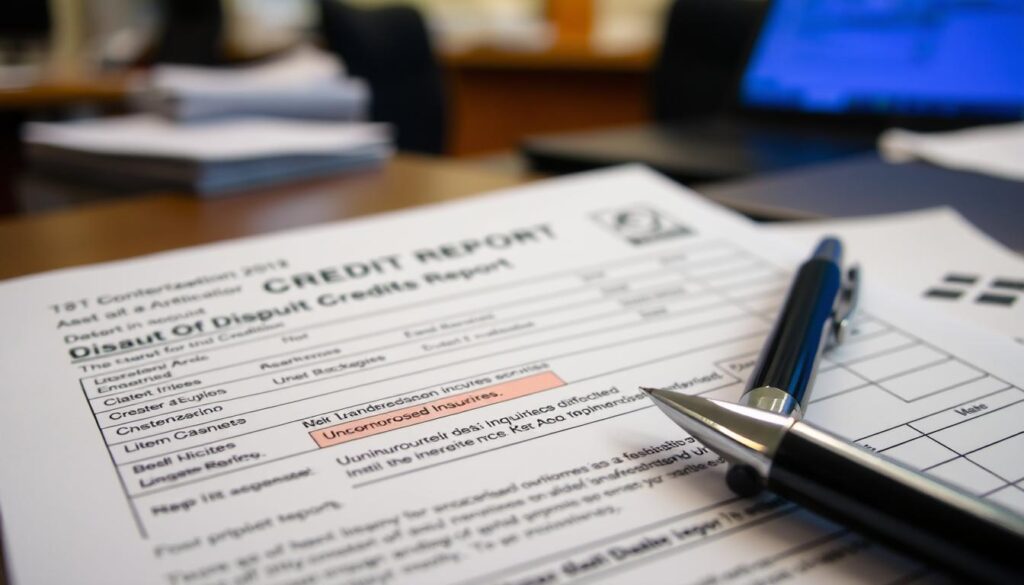A healthy credit score is vital for financial opportunities. Credit inquiries can impact your score negatively. These “hard pulls” occur when lenders check your credit history.
Too many inquiries can hurt your credit score. This makes it harder to get good loan terms. Some inquiries are necessary, but excess ones can be problematic.
We’ll explore strategies to remove inquiries from your credit report. You’ll learn about different types of inquiries and their consequences. We’ll also cover steps to dispute and eliminate unwanted or inaccurate inquiries.
This guide will help you how to remove inquiries fast. You’ll learn to delete credit report inquiries and dispute hard inquiries. We’ll show you how to remove hard inquiries effectively.
Our aim is to help you lower credit score inquiries. You’ll discover ways to eliminate credit report inquiries. We’ll teach you to erase hard credit pulls and get rid of credit inquiries.
Key Takeaways
- Credit inquiries can negatively impact your credit score, making it important to understand and manage them effectively.
- There are different types of credit inquiries, and it’s crucial to identify and dispute any unauthorized inquiries or inaccurate inquiries on your credit report.
- Strategies like disputing credit inquiries, negotiating with creditors, and using rapid rescoring services can help you clean up credit report inquiries and improve your credit score.
- Monitoring your credit report regularly and taking proactive steps to prevent future inquiries from damaging your credit can ensure long-term financial health.
- Removing inquiries can have a positive impact on your credit score, but it’s important to understand the process and potential limitations.
Understanding Credit Inquiries and Their Impact
Credit inquiries are crucial for managing your credit. They show who has viewed your credit report. This typically happens when you apply for credit, loans, or mortgages.
What Are Credit Inquiries?
Credit inquiries, or credit checks, help lenders assess your creditworthiness. They reveal your financial history and repayment likelihood. There are two main types: hard inquiries and soft inquiries.
Types of Credit Inquiries
- Hard Inquiries – These occur when you apply for new credit. They can negatively impact your credit score. Hard inquiries show you’re actively seeking new credit.
- Soft Inquiries – These happen for reasons other than credit applications. Examples include pre-approvals or background checks. Soft inquiries don’t affect your credit score.
Knowing the difference between these inquiries is vital. Hard inquiries can significantly impact your credit score. Be mindful of how many hard inquiries appear on your report.
Too many hard inquiries can harm your credit score. This can affect your ability to get new credit.
| Type of Inquiry | Impact on Credit Score | Reason for Inquiry |
|---|---|---|
| Hard Inquiry | Negative impact | Applying for new credit |
| Soft Inquiry | No impact | Background check, pre-approval |

“Credit inquiries are an important part of the credit reporting process, but it’s crucial to understand how they can affect your credit score and overall creditworthiness.”
The Consequences of Too Many Credit Inquiries
Too many credit inquiries can hurt your credit score. Each hard inquiry can cause a small, temporary drop. Multiple hard inquiries in a short time can be even more damaging.
Excessive inquiries can make it harder to get loans or credit cards. This can lead to higher interest rates or denied credit. A low credit score may also affect employment or housing opportunities.
| Scenario | Impact on Credit Score |
|---|---|
| Single Hard Inquiry | 5-10 point decrease |
| Multiple Hard Inquiries in a Short Time | 20-50 point decrease |
It’s important to know how credit inquiries affect your score. Be mindful of how many applications you submit. Carefully time your credit-related activities to protect your financial profile.
“Excessive credit inquiries can be a red flag for lenders, signaling potential financial instability or overspending. It’s important to be strategic and selective when applying for new credit.”

Disputing Unauthorized or Inaccurate Inquiries
Found unauthorized or inaccurate inquiries on your credit report? You have the right to dispute them. Gather relevant documents and file a formal dispute with credit bureaus. This can lead to removing problematic inquiries from your credit history.
Gathering Necessary Documentation
To dispute credit report inquiries, you’ll need supporting documentation. This includes copies of your credit report with highlighted disputed inquiries. You’ll also need proof of identity, like a driver’s license or social security card.
Gather any correspondence related to the disputed inquiries. Prepare detailed explanations of why the inquiries are unauthorized or inaccurate. Having this information ready will strengthen your case and speed up the process.
Filing a Dispute with Credit Bureaus
After gathering documents, initiate a dispute with the credit bureaus. Contact Experian, Equifax, and TransUnion by mail, phone, or online. Submit your supporting documentation to them.
Clearly explain why you’re disputing the inquiry. Request that the bureaus investigate and remove the disputed inquiry from your report. Following these steps can help improve your overall credit profile.

Negotiating with Creditors to Remove Inquiries
Negotiating with creditors can effectively remove inquiries from your credit report. This works best for inquiries from legitimate applications or transactions. Direct communication and proper documentation can help you reach an agreement.
Here are some tips for removing inquiries through creditor negotiation:
- Identify the problematic inquiries: Review your credit report to find specific inquiries for removal.
- Communicate with the creditor: Contact the inquiry’s creditor and explain your situation politely and professionally.
- Provide documentation: Share relevant documents like credit reports or transaction proof with the creditor.
- Negotiate in good faith: Work together to find a solution, such as removing or suppressing the inquiry.
- Follow up and ensure the removal: Confirm the creditor’s action and check your credit report for the inquiry’s removal.
Negotiating with creditors can be time-consuming, but it’s worth the effort. Persistence and proper documentation are crucial for success in this process.
“Negotiating with creditors is a powerful tool in the fight against unfair credit inquiries. With the right approach, you can often get them to remove these blemishes from your credit report.”

How to Remove Inquiries Fast
Need to remove credit inquiries quickly? A specialized service called “rapid rescoring” can help. It speeds up the process of cleaning your credit report.
Using Rapid Rescoring Services
Rapid rescoring services work directly with credit bureaus. They can remove inquiries in days or weeks, not months. These services use their connections to navigate the credit system efficiently.
Here’s how rapid rescoring services can help you remove inquiries fast:
- They can identify and dispute any unauthorized or inaccurate inquiries on your credit report.
- They have the ability to escalate the investigation process with the credit bureaus, resulting in a faster resolution.
- Their team of credit experts can provide guidance on the best strategies to remove inquiries and improve your credit score.
- They can help you negotiate with creditors to have legitimate inquiries removed from your report.
A rapid rescoring service can help you quickly remove inquiries. This can boost your credit fast. Better credit means better rates on loans and credit cards.
Rapid rescoring services can be a lifesaver for anyone struggling with the impact of too many credit inquiries on their credit score.
| Service | Average Turnaround Time | Cost |
|---|---|---|
| Rapid Rescoring | 7-14 days | $50-$200 per inquiry |
| Standard Credit Dispute | 30-45 days | Free |
Monitoring Your Credit Report for Inquiries
Reviewing your credit report often is key to spotting unauthorized inquiries. By doing this, you can find errors that may hurt your credit score. This helps you take quick action to dispute and remove these inquiries.
Checking for Errors and Inaccuracies
Closely monitor your credit report for inquiries to find any mistakes. Look for unfamiliar inquiries made without your consent. If you spot any inaccurate inquiries, act fast to dispute and remove them.
Here are some tips to help you identify inaccurate inquiries on your credit report:
- Thoroughly review all inquiries listed on your credit report, checking for any that you do not recognize.
- Ensure that the inquiries accurately reflect your recent credit applications and activities.
- If you find any inquiries that are inaccurate or unauthorized, make a note of them and prepare to dispute them with the credit bureaus.
| Inquiry Type | Impact on Credit Score |
|---|---|
| Hard Inquiries | Can temporarily lower your credit score by a few points |
| Soft Inquiries | Do not affect your credit score |
Regular checks of your credit report help keep your credit profile accurate. This practice lets you spot and fix any issues quickly.
“Staying vigilant and regularly reviewing your credit report is the best way to identify and address any unauthorized or inaccurate inquiries that could be damaging your credit score.”
Preventing Future Inquiries from Damaging Your Credit
Protect your credit score by limiting hard inquiries on your report. Be selective with credit applications and group similar inquiries. Use “soft pull” pre-approvals when possible.
Limiting Hard Inquiries
Hard inquiries can negatively impact your credit score. They occur when you apply for new credit, like cards or loans.
To prevent future credit inquiries and limit hard inquiries, try these strategies:
- Be selective with credit applications: Carefully evaluate your need for new credit and only apply for what you truly require.
- Group similar inquiries: If you’re rate shopping for a loan, such as a mortgage or auto loan, try to complete all applications within a short period (usually 14-45 days). This will be counted as a single inquiry, mitigating the impact on your credit score.
- Utilize “soft pull” pre-approvals: Whenever possible, opt for pre-approval processes that involve a “soft pull” on your credit, which does not affect your score. This allows you to gauge your eligibility without incurring a hard inquiry.
Implementing strategies to reduce credit inquiries helps maintain a healthy credit profile. Your credit score will thank you in the long run.
The Impact of Removing Inquiries on Your Credit Score
Removing wrong or unauthorized inquiries from your credit report can boost your credit score. This can help you get better interest rates, loans, and credit cards. Your overall financial health can improve significantly.
Removing inquiries has two main benefits. It can lower your credit utilization ratio, which is key to your credit score. This shows lenders you’re managing credit well.
It also shows creditors you’re not seeking new credit lines. This can be seen as a sign of financial stability. As a result, you may get better loan terms and interest rates.
| Metric | Before Removing Inquiries | After Removing Inquiries |
|---|---|---|
| Credit Score | 700 | 720 |
| Credit Utilization Ratio | 35% | 30% |
| Interest Rate on Auto Loan | 5.5% | 4.8% |
“Removing unnecessary inquiries from your credit report can be a game-changer, boosting your credit score and unlocking better financial opportunities.”
Removing inquiries can greatly impact your credit score. It can lead to better credit utilization and loan terms. By disputing wrong inquiries, you can take charge of your financial future.
Conclusion
This article outlines steps to remove inquiries from your credit report. By following these steps, you can improve your credit score. You’ll gain control over your credit profile and build a stronger financial future.
Stay alert and monitor your credit report regularly. Address unauthorized or incorrect inquiries quickly. Use negotiation tactics with creditors when possible. Consider rapid rescoring services for immediate results.
Improving your credit score is an ongoing process. With the right tools and determination, you can overcome credit inquiry challenges. Take charge of your credit management to build financial stability.
Use these strategies to protect your credit score. You’ll enhance your borrowing power and set yourself up for financial success. Take control of your financial future today.

